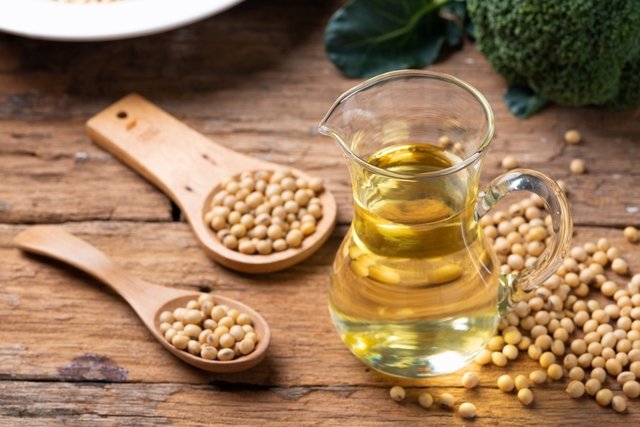Soy lecithin is a supplement obtained through the extraction of oil from soybeans, which is rich in vitamin B8 (choline), phosphorus and other compounds that promote health and well-being.
Among other benefits, soy lecithin improves women's health, combating PMS symptoms and relieving menopause symptoms. Furthermore, the supplement helps in the treatment of diseases such as Alzheimer's, stress and also helps to reduce blood levels of cholesterol and triglycerides, preventing cardiovascular diseases.
Soy lecithin can be found in capsule form and should be taken throughout the day, during meals. Despite being a natural supplement, it is important that it is only consumed under the advice of a general practitioner.

Health benefits
The main health benefits of soy lecithin are:
1. Relieving menopause symptoms
Because it is rich in choline, soy lecithin is a supplement that can be taken to help with hormonal changes that are common during menopause. Check-out other natural remedies for menopause that you can take to relieve symptoms.
One study [1] showed that supplementation with 1200mg of soy lecithin for 8 weeks not only improved physical and mental disposition, but also helped regulate blood pressure in women during menopause.
2. Lowering cholesterol levels
Supplementation with soy lecithin helps to reduce fat absorption in the body and increase the elimination of fat in the feces. This can result in a direct reduction in LDL cholesterol and increase in HDL cholesterol. Therefore, lecithin supplementation can be a great tool to help treat high cholesterol.
Taking a supplement with 500 mg of soy lecithin for 2 months showed a significant reduction in cholesterol levels among study participants [2].
3. Improving PMS symptoms
Phosphatidic acid and phosphatidylserine, which are components of soy lecithin, have demonstrated to be effective in reducing cortisol levels in the body, helping to relieve symptoms of stress and depression. It can also promote the well-being of women during PMS.
Also recommended: 16 PMS Symptoms You Should Know (w/ Symptom Checker) tuasaude.com/en/pms-symptomsOne study [3] shows that a lecithin supplement with 400mg of phosphatidic acid taken along with 400mg of phosphatidylserine for 2 months showed a reduction in symptoms of depression and tiredness in young women during PMS. Furthermore, this supplementation also reduced cortisol levels, which can reduce the stress that may occur during this period.
4. Relieving menopause symptoms
The use of soy lecithin is an excellent way to reduce menopause symptoms, as it is rich in essential polyunsaturated fatty acids and B-complex nutrients such as choline, phosphatides and inositol. These components can be beneficial for hormonal changes that typically occur during this time.
The use of soy lecithin, taken as directed by a doctor, can help to reduce hot flashes, improve libido, manage hormonal changes, combat insomnia and reduce bone loss. Learn more about the symptoms of menopause that many women may experience.
5. Preventing cardiovascular diseases
Soy lecithin promotes the reduction of LDL levels and the increase of HDL cholesterol levels. It can help to reduce the risk of developing cardiovascular diseases, such as high blood pressure, heart attack and stroke.
6. Improving memory in cases of Alzheimer's and dementia
Phosphatidic acid and phosphatidylserine, some of the components of soy lecithin, are also compounds that are naturally found in nervous system cells. They play a role in reducing brain cell damage and improving overall brain functioning.
One study [4] showed that supplementation with soy lecithin for 2 months improved memory, cognitive reasoning and maintaining optimal mood mood in elderly people with Alzheimer's. It can also help to reduce the risk for depression.
Nutritional information
The following table outlines the nutritional information in one 500 mg capsule of soy lecithin:
It is important to highlight that the amount of soy lethicin found in one capsule can vary depending on the brand of the supplement, and you should therefore refer to the manufacturer label on the bottle.
In addition to lecithin in capsule form, eating soybeans every day also helps to prevent heart disease and cancer.
How to take
In general, the daily recommended dose of soy lethicin is 2 capsules, 3 times per day, taken with water during meals.
The dose can vary between 0.5 g and 1 g per day, with a maximum of up to 2 g per day, depending on the treatment goals established by your doctor.
Possible side effects
Soy lecithin is generally well tolerated, with no side effects noted after ingestion. However, there are some people who may be allergic to soy lecithin. In these cases, symptoms such as difficulty breathing, swelling in the throat and lips, as well as red spots on the skin and itching may appear. If you notice these symptoms, discontinue use immediately and seek urgent medical attention.
Who shouldn't take
This supplement is not recommended for use during hormone replacement therapy and for those who are allergic to this supplement. Soy lecithin should not be consumed without medical advice by children under 10 years of age, pregnant women and breastfeeding women.
Soy lecithin, which is the fatty part of the soybean, has no influence on the functioning of the thyroid gland and can be safely consumed by those with problems such as hypothyroidism.
